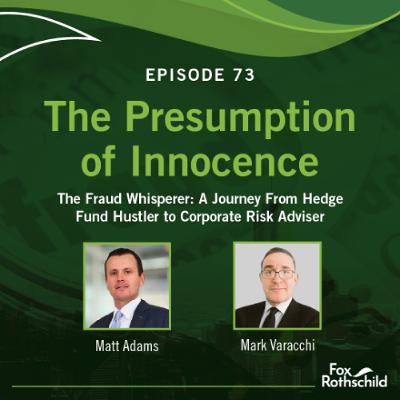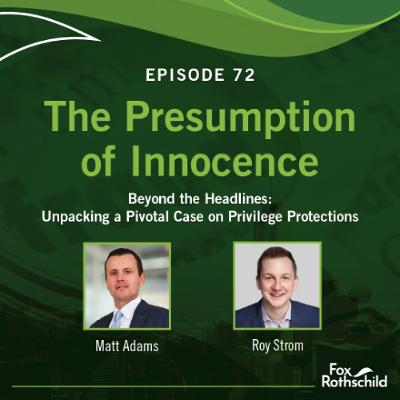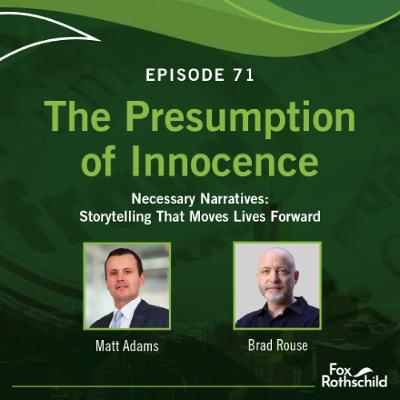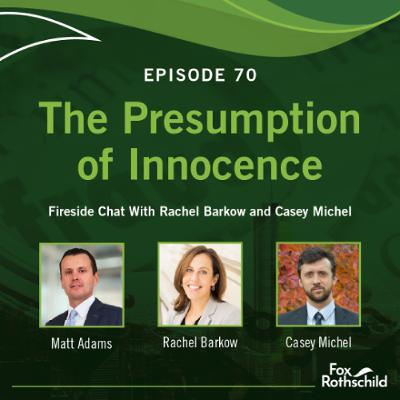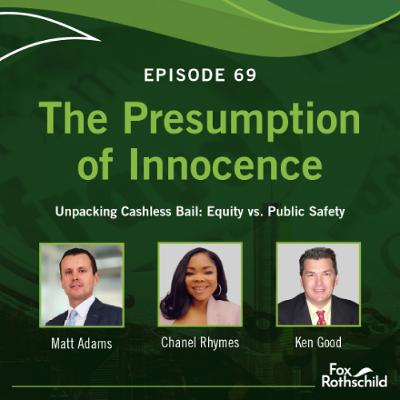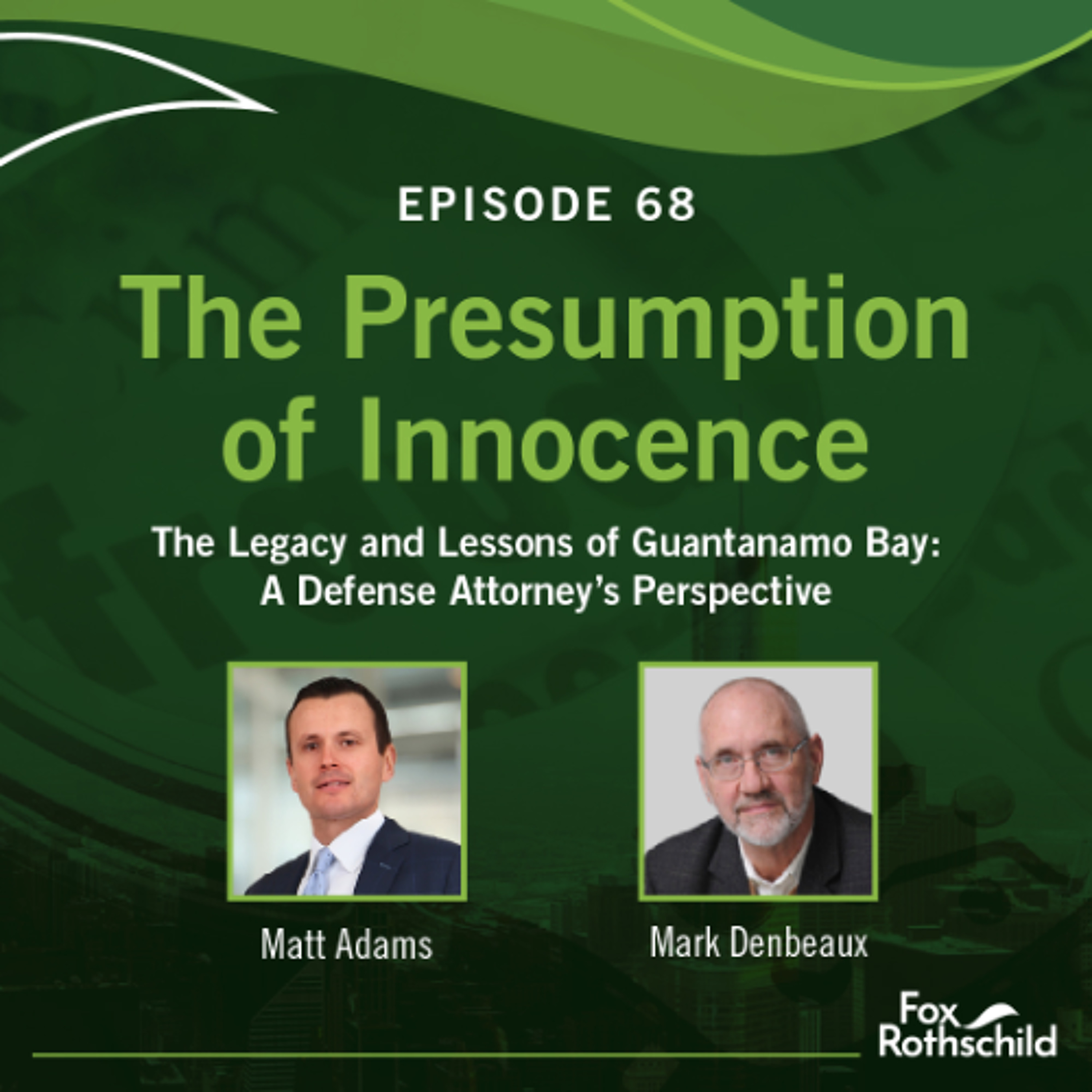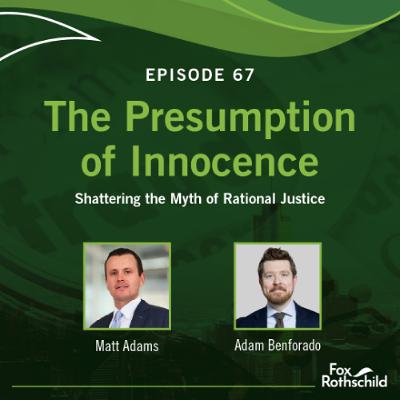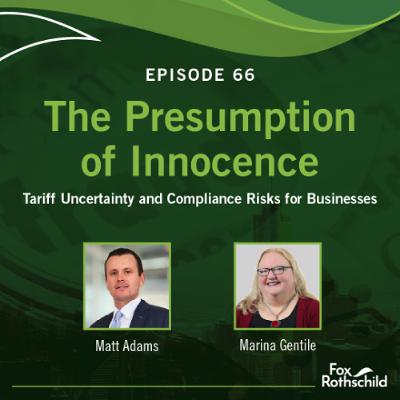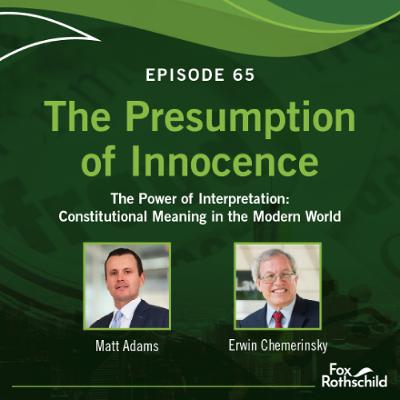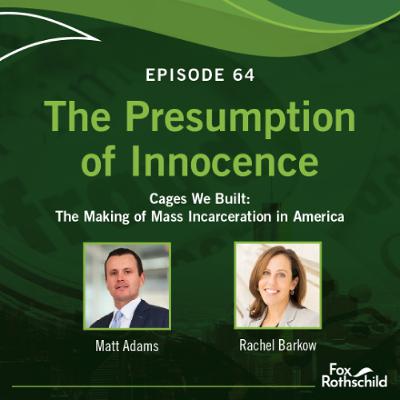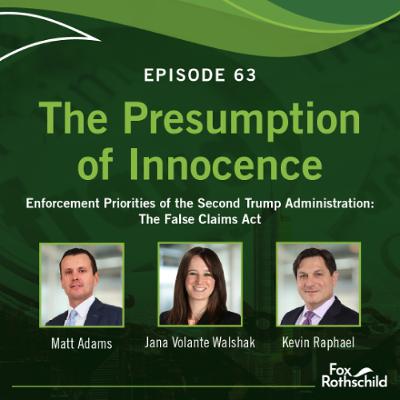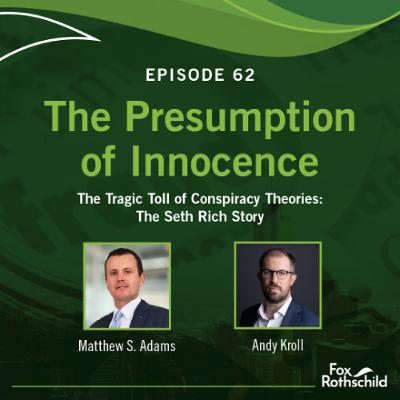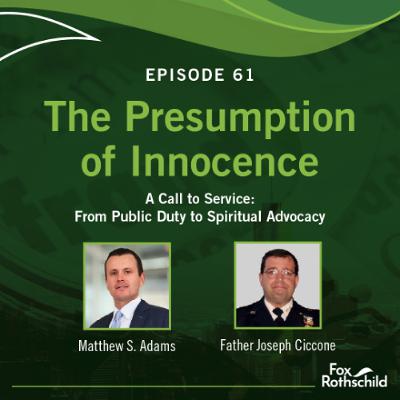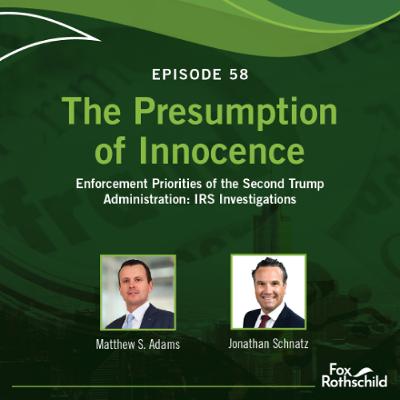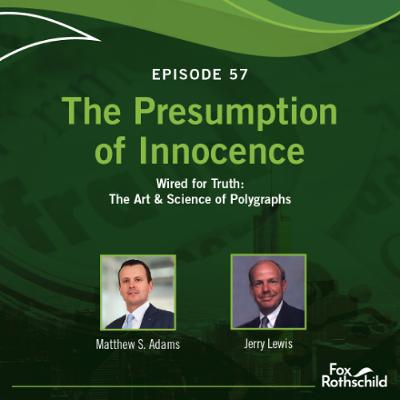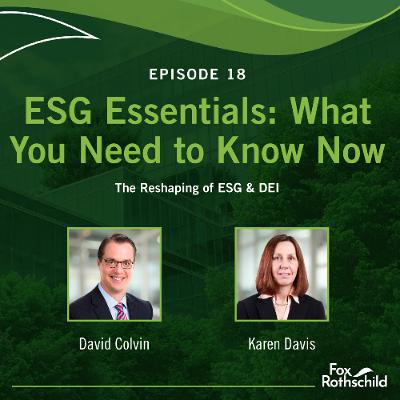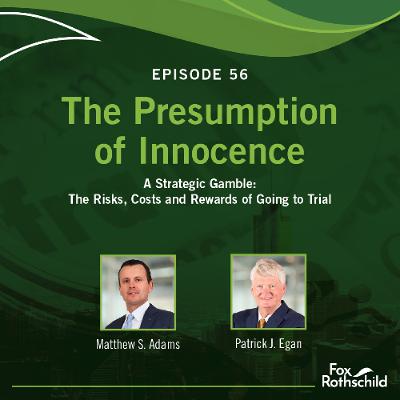Discover Legal Listening: The Fox Rothschild LLP Podcast
Legal Listening: The Fox Rothschild LLP Podcast

Legal Listening: The Fox Rothschild LLP Podcast
Author: Fox Rothschild LLP
Subscribed: 3Played: 41Subscribe
Share
© All rights reserved
Description
Fox Rothschild LLP is a national law firm with over 1000 attorneys coast to coast. Our lawyers provide a full range of legal services to public and private companies – from family-run businesses to multinational corporations. We also represent charitable, medical and educational institutions both in the United States and in more than 50 countries worldwide. In our podcasts, the attorneys of Fox share their insight and knowledge on some of today’s most pertinent legal issues impacting individuals and businesses.
219 Episodes
Reverse
Episode 73
The Fraud Whisperer: A Journey From Hedge Fund Hustler to Corporate Risk Adviser
Determined to reshape his future once he was released from FCI Otisville, convicted white-collar criminal Mark Varacchi immersed himself in uncovering statistics on white-collar fraud to lay the groundwork for his post-prison life.
The former hedge fund C-suite executive, who now runs Federal Prison Consultancy, interviewed countless fellow inmates while at Otisville who were also convicted of fraud, seeking to identify and uncover patterns in how they were able to perpetrate the fraud for which they were convicted. Today, he’s armed with a new kind of knowledge that helps companies prevent and uncover fraud.
Mark joins host Matt Adams in this fascinating episode that explores how his career spiraled downward as he mismanaged millions, including the immense anxiety he carried each day of potentially being called out for his actions.
They also discuss how and why Mark used his prison time strategically to gain insights on how other white-collar criminals skated through financial systems to commit fraud. That insight fuels Mark’s newfound career in helping businesses understand and apply his findings.
Episode 72
Beyond the Headlines: Unpacking a Pivotal Case on Privilege Protections
A federal court ruling issued in a case involving an alleged bribery scandal shook the legal world when it appeared to limit attorney-client privilege and the work product doctrine.
The case grabbed the attention of Bloomberg Law reporter Roy Strom, who followed the matter through its reversal by an appeals court.
He joins host Matt Adams to explore this case from their respective positions: a journalist and a lawyer.
Roy offers his insight into the value of amicus briefs, especially when he sees law firms banding together to argue for the sanctity of attorney-client privilege.
The two also discuss the evolving landscape of white-collar defense law, and Roy offers advice on how lawyers can most effectively interact with journalists.
Episode 71
Necessary Narratives: Storytelling That Moves Lives Forward
Harnessing his personal experience as an incarcerated individual and his writing talents as a storyteller, Brad Rouse is focused on helping defendants accelerate their path to redemption and healing.
A former on- and off-Broadway director who spent time in Brooklyn’s Metropolitan Detention Center (MDC) on a federal drug charge, Brad is currently a Senior Writer and Mitigation Consultant for WhiteCollarAdvice.com, a business that helps white-collar defendants through all stages of the judicial process.
Brad shares with host Matt Adams how his life unraveled in a 14-month span, taking him from New York’s theater district into a drug addiction that landed him in the MDC. Today, he’s crafting written narratives for defendants to present to judges at their sentencing hearings.
Brad approaches each storytelling exercise as a holistic form of healing for his clients. Through a series of conversations with each defendant, he works to convey to judges a contextual understanding of the person they are about to sentence, showing each as more than the crime to which they have pleaded guilty.
Episode 70
Fireside Chat With Rachel Barkow and Casey Michel
Recorded at our 2025 White-Collar Symposium earlier this month, this special episode gives guests Rachel Barkow and Casey Michel an opportunity to address the issues explored in each other’s books.
With host Matt Adams as moderator, Rachel — an author, law professor and former clerk for Justice Antonin Scalia — and Casey — an investigative journalist and Director of the Combating Kleptocracy Program at the Human Rights Foundation — explore the common themes in criminal law that connect their works.
Rachel and Casey dig into how constitutional rights, judicial interpretation of those rights and legislative statutes influence both mass incarceration and foreign lobbying.
Their conversation weaves together turning points and pivotal figures in U.S. history — Richard Nixon and Bob Dole, the Gilded Age and the 1960s — and identifies how those moments and individuals have shaped today’s realities.
Episode 69
Unpacking Cashless Bail: Equity vs. Public Safety
The debate over cashless bail has intensified following the August Executive Order calling for its nationwide elimination.
In this episode, host Matt Adams moderates a conversation featuring dueling perspectives on the cashless bail issue from guests Chanel Rhymes and Ken Good.
Chanel is the Director of Advocacy for the Northwest Community Bail Fund, which provides cash bail to those for whom it's not accessible, and fights against the cash bail system. Ken Good is a board member of the Professional Bondsman of Texas, author, podcaster and lawyer who represents the cash bail industry.
Chanel and Ken highlight the merits and drawbacks of both cash and cashless bail, rooted in their personal and professional experiences with both systems.
Episode 68
The Legacy and Lessons of Guantanamo Bay: A Defense Attorney’s Perspective
More than two decades have passed since the doors of Guantanamo Bay were opened to house alleged terrorists. Those doors remain open, though the number of detainees has dwindled to 15.
In this episode, Mark Denbeaux, Professor Emeritus and Director of the Center for Policy and Research at Seton Hall University School of Law, shares his personal experiences representing Guantanamo Bay prisoners and looks at the lessons learned, and the lives and liberties lost, in America’s war on terror.
Mark, who visited the facility more than 100 times over the course of his representations, joins host Matt Adams to discuss how the road to Guantanamo was paved with the legacy of America’s internment of people of Japanese descent, most of whom were American citizens, during the Second World War.
Mark and Matt also weave the historical threads leading to the current administration’s detention facilities for individuals accused of entering the country illegally and its approach to habeas corpus — a legal recourse against unlawful detention.
Episode 67
Shattering the Myth of Rational Justice
The American justice system is based on incorrect assumptions about the rationality and logic of human behavior.
That’s according to Drexel University Law Professor Adam Benforado, the New York Times bestselling author of Unfair: The New Science of Criminal Injustice.
Using the disciplines of psychology and social science upon which he based his book, Adam and host Matt Adams explore the systemic blind spots of the criminal justice system in the investigation, adjudication and punishment stages.
They also examine the potential to rebuild and reform the system using a more realistic model set of human behavior.
Episode 66
Tariff Uncertainty and Compliance Risks for Businesses
The Trump administration’s fluctuating tariffs pose major compliance risks for businesses operating in the U.S.
Dive into the challenges they pose to businesses that rely on imported goods and services as Marina Gentile joins host Matt Adams to break down the complex aspects of global transfer pricing. A Partner and Lead of the Global Transfer Pricing Strategies Practice at the accounting and advisory firm Withum, Marina draws on 30 years of experience to explain how businesses seeking to mitigate the cost of tariffs can inadvertently engage in tax manipulation.
You’ll learn what businesses need to do to stay ahead of the compliance curve and discover what could be coming next for global trade.
Episode 65
The Power of Interpretation: Constitutional Meaning in the Modern World
The Constitution takes center stage in this latest episode with legal scholar Erwin Chemerinsky, Dean of UC Berkeley Law, who is renowned for his studies of constitutional law and federal civil procedure.
He and host Matt Adams dig into how the Constitution is interpreted, and occasionally misunderstood, by elected and appointed federal government officials.
They also discuss U.S. Supreme Court rulings issued from the Warren court to today in cases involving constitutional law. They explore how the concept of “originalism” has influenced decisions involving civil rights, executive immunity, election campaigns and more.
This intriguing episode also touches on whether it’s time to draft a new, more modern Constitution.
This episode of The Presumption of Innocence was recorded days before the Supreme Court ruled in Trump v. CASA, Inc., restricting federal courts’ ability to issue nationwide injunctions, an outcome our guest examines prospectively in the first half of the podcast.
Episode 64
Cages We Built: The Making of Mass Incarceration in America
The U.S. imprisons a larger percentage of its population than any other country in the world. How did we get here?
Rachel Barkow, Charles Seligson Professor of Law and Faculty Director of the Zimroth Center on the Administration of Criminal Law at New York University School of Law, returns to the podcast for an in-depth discussion on that very topic with host Matt Adams.
Rachel’s second book, Justice Abandoned: How the Supreme Court Ignored the Constitution and Enabled Mass Incarceration, centers the conversation, highlighting six key Supreme Court cases. Rachel asserts that, had the justices ruled differently, their decisions would have created an American society where incarceration rates remained similar to other Western democracies.
Rachel and Matt also discuss the financial, societal and practical costs of rising incarceration trends, and whether it’s possible to reverse the trajectory.
Episode 63
Enforcement Priorities of the Second Trump Administration: The False Claims Act
The Deputy Attorney General of the United States has made it clear that the Department of Justice intends to enforce the False Claims Act (FCA) in a way it never has before: in the pursuit of civil rights fraud.
Listen as host Matt Adams is joined by his Fox colleagues Jana Volante Walshak and Kevin Raphael to break down the DOJ's internal memo, titled “Civil Rights Fraud Initiative,” and explain how this new enforcement focuses on “illegal DEI” and impacts businesses and universities that accept federal funds.
Matt, Jana and Kevin provide a history of the FCA from its origins in the Reconstruction Era up to present day. They also explore how the act’s traditional compliance emphasis compares to the current administration’s priorities, and detail the incentives to encourage whistleblowers.
Additionally, they forecast how the FCA may be used to enforce other administration priorities in the coming years.
Episode 62
The Tragic Toll of Conspiracy Theories: The Seth Rich Story
A violent, unsolved murder of an up-and-coming young professional in our nation’s capital. A grieving family in the Midwest. And conspiracy theories both ignited and inflamed by politics.
Listen in as investigative journalist Andy Kroll returns to the podcast to dive into his book, “A Death on W Street: The Murder of Seth Rich and the Age of Conspiracy.”
Andy and host Matt Adams take us back to the 2016 election year to examine why and how conspiracy theories took flight after the death of Seth Rich. You’ll hear how a family in mourning sought — and got — justice against a narrative of falsehoods and how the court system continues to hold the line to facts.
Episode 61
A Call to Service: From Public Duty to Spiritual Advocacy
Father Joseph Ciccone's mission to serve the public has been an unwavering and guiding force throughout his life.
He’s held many titles over the years: Police Officer. Teacher. Detective. Bergen County Sheriff. Priest. But the title that brings him to the podcast today is that of convicted felon.
Father Joe joins host Matt Adams to detail his life of public service, from his early days as a beat cop in the 1980s to his foray into elected public office — which ultimately led him to become the target both of hate crimes and of the Bergen County Prosecutor's Office.
After pleading guilty, Father Joe dedicated his life as a priest to advocacy for criminal justice reform.
This thought-provoking episode also touches on how Father Joe’s personal life as a gay man and his progressive social initiatives as a cop, detective and county sheriff impacted the trajectory of his life.
The Trump administration has issued approximately 130 executive orders so far, and many deal with environmental and energy matters.
Listen as David Colvin and Karen Davis, Co-Chairs of our ESG Practice, dive into the emerging themes of these executive orders.
They specifically dig into the details of EO 14260, “Protecting American Energy From State Overreach" — which calls for federal action against localized energy laws — and speculate whether the Trump administration will join litigation challenging energy laws out of New York and Vermont.
The bite-sized episode also explores how this executive order aligns with current EPA policies.
Episode 60
Enforcement Priorities of the Second Trump Administration: Employee Retention Tax Credit
Five years and two presidential administrations later, tensions remain — with the IRS and tax credit applicants — over the pandemic-era Employee Retention Tax Credit (ERC).
While the IRS has been continuing a Biden-era restrictive policy, a new mandate may be coming when a new IRS Commissioner is confirmed.
Fox attorneys Brian Bernhardt and Jonathan Wasser join host Matt Adams for a comprehensive look at the current state of the ERC. They also discuss Billy Long — the current IRS commissioner nominee — and how his background may shape his plans for the agency’s approach to the ERC.
Brian and Jonathan also forecast what’s likely to come for the IRS and the ERC in light of staffing reductions.
Episode 59
Enforcement Priorities of the Second Trump Administration: DOJ Focus
While President Trump’s first administration focused on reshaping the judiciary, he’s indicated a priority of his second administration will be reshaping the federal justice system.
In this episode, reporter Andy Kroll and host Matt Adams explore the commonalities among recent U.S. Attorney appointments and how these newly named individuals may impact the overall enforcement priorities of the Department of Justice. They discuss what makes this presidential term different — and what makes it the same — as well as how reductions in force and other staffing changes across multiple federal agencies align with the president’s stated vision and agenda.
An investigative journalist known for his in-depth reporting on the intersections of politics, money and power, Andy currently serves as a national reporter for ProPublica, where he covers justice and the rule of law, including the Justice Department, U.S. Attorneys and the courts.
Episode 58
Enforcement Priorities of the Second Trump Administration: IRS Investigations
What’s on the Trump administration’s agenda when it comes to federal investigations?
Listen to the first in a series of episodes aimed at answering that question.
Former IRS Special Agent Jonathan Schnatz joins host Matt Adams to discuss his experience as world events and changing presidential administrations shifted IRS priorities during his 25-year tenure in the Criminal Investigations division.
Now a Principal at Withum, Jonathan shares his opinions and prognostications on the administration enforcement priorities for the IRS, including the suggestion that IRS agents will be deployed to the U.S./Mexico border.
Matt and Jonathan also dig into the recently released IRS “Dirty Dozen” list and weigh the likelihood of them becoming enforcement priorities.
Episode 57
Wired for Truth: The Art & Science of Polygraphs
The polygraph test: We’ve all seen it used in popular movies, but what is it the truth behind how it’s used in the criminal justice system?
Jerry Lewis, a retired New Jersey State Police lieutenant who’s been administering polygraphs since 1981, joins host Matt Adams to peer inside the mechanics of the test.
They explore the science at work in a polygraph machine and the art of questioning a subject — and how to identify when someone is lying without a polygraph.
Jerry also addresses criticisms of the polygraph, defends his opinion on forced confessions and discloses the role he played in catching the killer of Megan Kanka, the namesake of Megan’s Law.
From executive orders to state laws, elements of ESG are being transformed.
Podcast hosts David Colvin and Karen Davis, who also co-chair the firm’s ESG Practice Group, explore the impact of the New York Climate Change Superfund Act and consider how it may serve as a springboard toward a potential uptick in state climate change actions.
They also turn to the Trump administration’s executive orders regarding DEI. This episode explains what the actions mean for government contractors as well as private companies. It also offers suggestions on what companies should do during the safe harbor period that runs until April of this year.
Episode 56
A Strategic Gamble: The Risks, Costs and Rewards of Going to Trial
Statistics weigh heavily against defendants in the criminal justice system. Only 0.4% were acquitted after trial in federal cases during fiscal year 2022.
In this latest podcast episode, host Matt Adams is joined by firm colleague Patrick Egan, whom Matt describes as “the type of trial lawyer you go to when your only option is to roll the dice and go to trial taking a shot against all odds.”
Patrick, a Fox Partner and Chair Emeritus of the firm’s White-Collar Criminal Defense & Regulatory Compliance Practice, discusses how he navigates clients through the decision to go to trial and shares his insights into the political and procedural reasons why statistics favor prosecutors.
Patrick also recounts the details of one of his most high-profile acquittals involving a Philadelphia politician innocent of the charges lobbied against him.


